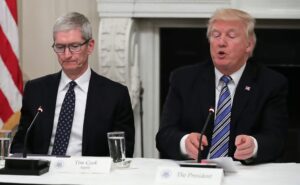The global automotive industry is bracing for another wave of protectionism as President-elect Donald Trump promises sweeping tariffs on imports. Industry executives at the CES tech conference in Las Vegas revealed that auto suppliers are exploring production shifts to the United States or nearby regions to mitigate the potential financial fallout.
Trump’s proposed trade policies include a 10% blanket tariff on global imports and a staggering 60% tariff on Chinese goods. Additionally, he pledged a 25% tariff on imports from Canada and Mexico, which are integral to North American auto supply chains.
These measures could render many cost-effective production models unviable. “Anyone can do the math,” said Paul Thomas, North American president of Bosch, the world’s largest car parts supplier. “If it’s 10%, 20%, 60%… you have to say, ‘OK, how many scenarios make sense for that, and which ones do we act on?’”
For Bosch, this means considering alternative manufacturing locations. Thomas cited regions like Mexico or Brazil, where the company already has an operational presence. However, he noted that Bosch is waiting until Trump takes office on January 20 before making significant moves.
The Shift to Localization: A Growing Trend
The automotive sector has been gradually localizing production to avoid supply-chain disruptions, a trend accelerated by the U.S. Inflation Reduction Act (IRA). This legislation incentivized local production, particularly in the electric vehicle (EV) sector.
Major suppliers like Panasonic Energy have already taken steps to reduce their reliance on Chinese materials. Panasonic, which supplies EV batteries to Tesla, aims to eliminate all Chinese content from its U.S.-made batteries. “That’s the No. 1 objective,” said Allan Swan, Panasonic Energy’s North American president.
Similarly, Continental, a German auto parts supplier, is working with North American suppliers to source alternative components and avoid tariffs. CEO Nikolai Setzer noted that localizing production “wherever it makes sense” has been a strategic priority for the company.
Challenges for the EV Sector
Tariffs could exacerbate existing challenges for the automotive industry, particularly in the EV market. Rising labor costs, worker shortages, and a slowdown in EV growth have already strained suppliers.
According to Leonard LaRocca, U.S. automotive industry leader at KPMG, “Tariffs will potentially exacerbate supplier worries as EV demand is likely to fall further this year.” Automakers pursuing EV subsidies under the IRA may face uncertainty as the incoming Trump administration aims to dismantle parts of the law.



